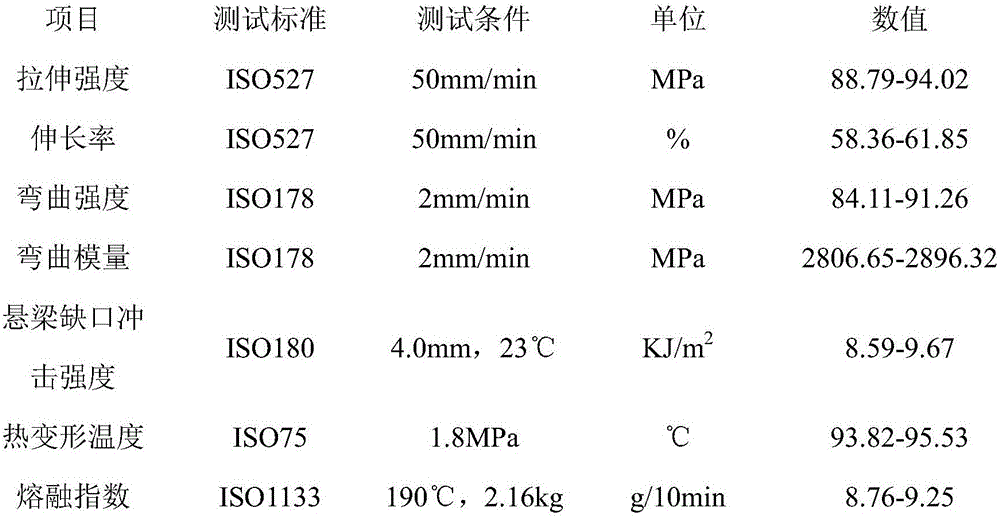Graphene printing material
A printing material, graphene technology, applied in the direction of additive processing, etc., can solve the problems of low thermal deformation temperature and melt index, tensile strength, bending strength, notched impact strength, etc., to achieve high thermal deformation temperature and melt index, High flexural strength and notched impact strength, wide-ranging effects
- Summary
- Abstract
- Description
- Claims
- Application Information
AI Technical Summary
Problems solved by technology
Method used
Image
Examples
preparation example Construction
[0076] The preparation method of described graphene printing material, comprises the following steps:
[0077] S1: Purchase two-dimensional graphene raw materials on the market, and prepare primary graphene powder through special treatment;
[0078] S2: Use a hard plastic crusher to initially crush waste plastics, and then use an intermittent stirring plastic washing machine to thoroughly clean the crushed waste plastics to remove surface dirt. After natural drying and selection, selected plastics are obtained;
[0079] S3: Put the selected plastic prepared in step S2 in a nitrogen or dry ice low-temperature pulverizer, pulverize the plastic at a temperature of -90--110°C for 2-3 hours, and obtain 400-600 mesh plastic fine particles after sieving ;
[0080] S4: Add polylactic acid, potassium tripolyphosphate, adipate, and specific synthetic agents to the primary graphene powder obtained in step S1 and the plastic fine particles obtained in step S3, and heat up to 196-225° C. ...
Embodiment 1
[0093] A kind of described graphene printing material, in weight part, comprises following raw material: 6.6 parts of graphene, 28 parts of waste plastics, 38 parts of polylactic acid, 20 parts of potassium tripolyphosphate, 24 parts of adipate, specific synthesis 16 parts of agent, 8 parts of starch synthesis agent;
[0094] The specific synthetic agent is in parts by weight, including the following raw materials: 18 parts of regulator, 15 parts of generating agent, 13 parts of coupling agent a, 14 parts of compatibilizer, 10 parts of plasticizer, 8 parts of antioxidant, polymer 7 parts of coagulant, 4 parts of terminator, 3 parts of stabilizer a;
[0095] The regulator is ACR;
[0096] The generating agent is an aerosol generating agent;
[0097] The coupling agent a is a silane coupling agent KH550;
[0098] Described compatibilizer is maleic anhydride graft compatibilizer;
[0099] Described plasticizer is two (2-ethylhexyl) phthalates;
[0100] The antioxidant is Ron...
Embodiment 2
[0131] A kind of described graphene printing material, in weight part, comprises following raw material: 5.5 parts of graphene, 24.6 parts of waste plastics, 34.2 parts of polylactic acid, 11.6 parts of potassium tripolyphosphate, 18.3 parts of adipate, specific synthesis 9.2 parts of agent, 5.2 parts of starch synthesis agent;
[0132] The specific synthetic agent is in parts by weight, including the following raw materials: 15 parts of regulator, 12 parts of generating agent, 10 parts of coupling agent a, 12 parts of compatibilizer, 9 parts of plasticizer, 6 parts of antioxidant, polymer 5 parts of coagulant, 3 parts of terminator, 2 parts of stabilizer a;
[0133] The regulator is ACR;
[0134] The generating agent is an aerosol generating agent;
[0135] The coupling agent a is a silane coupling agent KH550;
[0136] Described compatibilizer is maleic anhydride graft compatibilizer;
[0137] Described plasticizer is two (2-ethylhexyl) phthalates;
[0138] The antioxid...
PUM
 Login to View More
Login to View More Abstract
Description
Claims
Application Information
 Login to View More
Login to View More - R&D
- Intellectual Property
- Life Sciences
- Materials
- Tech Scout
- Unparalleled Data Quality
- Higher Quality Content
- 60% Fewer Hallucinations
Browse by: Latest US Patents, China's latest patents, Technical Efficacy Thesaurus, Application Domain, Technology Topic, Popular Technical Reports.
© 2025 PatSnap. All rights reserved.Legal|Privacy policy|Modern Slavery Act Transparency Statement|Sitemap|About US| Contact US: help@patsnap.com

